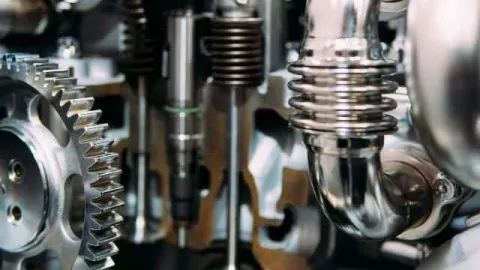It can be frustrating when a diesel engine loses power, especially right when you are in the midst of a job. However, understanding the issue can go a long way towards fixing the problem.
A diesel engine loses power when it’s hot because the energy from the fuel is going towards heating the engine rather than powering it. There are many specific problems that can cause this, including clogged fuel filters or exhaust pipes, dirty air filters, dirty spark plugs, or poor compression.
If you have a diesel engine that has lost power after getting hot, read on to learn more about why this happens, how you can recognize it, and what you can do.
What Causes a Diesel Engine to Lose Power When It Is Hot?
If you’re wondering what could cause a diesel engine to get hot, it really comes down to the combustion process. Combustion is what happens to release the energy of the fuel so that it can power the machine (source). Ideally, the fuel is supposed to convert fully to carbon dioxide and water, but this isn’t what typically happens.
There is typically energy released by the process of combustion that is not converted into useful work. In fact, according to the second law of thermodynamics, only a fraction of this energy can be converted into actual work (source).
If combustion energy is not converted to mechanical work, which in this case means that it is not being used to power the engine, it is typically released as heat (source). This will usually appear as heat transfer through combustion chamber surfaces or hot exhaust gases that are released into the environment.
There is also some work that needs to be used to overcome barriers within the system, such as friction between sliding surfaces and the operation of auxiliary components, such as oil and coolant pumps.
However, the heat is created by the process that occurs in the internal combustion engine. When the engine is running, air and fuel mix to create a combustible mixture. When this mixture is ignited, it will power the engine, but it will also release energy in the form of heat. This is what makes the engine hot (source).
If the efficiency of the system is very low, too much of the energy will go into heating up the engine rather than powering the vehicle. This is one conceivable reason why the vehicle would lose power when the engine overheats. There is simply not enough energy to power the engine when so much of it is being lost as heat.
What Issues Can Cause Your Engine to Lose Power?
Even though you know that poor fuel efficiency is generally what causes your engine to lose power, there are several potential causes of poor efficiency (source). They are as follows:
- Clogged fuel filter. The fuel filter takes impurities out of the gas so that it doesn’t go into the engine. If the fuel filter is clogged, the contaminants won’t be kept out of the engine, which can cause it to lose power.
- Clogged exhaust pipe. The exhaust system, which consists of the catalytic converter and muffler, minimizes the amount of pollution that is created by exhaust fumes. If the pipe is clogged, this will reduce the power of the engine.
- Dirty air filter. Air from the outside goes through a filter in order to keep contaminants out of the engine. If it’s dirty, the air that enters the engine will interfere with power generation, since power is generated by a mix of fuel and air.
- Dirty spark plugs. If the spark plugs have carbon deposits, they may not be able to fire properly, leading to loss of power.
- Poor compression. In order to function well, an engine needs good cylinder compression. If it does not have this, it will lose power.
There are few things that you can try if your engine is losing power:
- Change the oil regularly. If you don’t regularly maintain the oil, it can develop unwanted residues and have more difficulty moving through your engine. It will also take more power for your engine to move the oil through.
- Use higher-quality fuel. High-quality fuel is less likely to become contaminated.
- Maintain your filters. It’s important that you clean and change your fuel and air filters when necessary.
- Get a professional involved. If you don’t know what the issue is, it’s better to seek professional help rather than trying to fix it yourself.
How Can You Tell That You Have an Overheated Engine?
There are several common symptoms of an overheated engine. These are usually the ways that you can tell that the engine is too hot, since most people are not actually going to check the temperature of the engine manually.
The safe thing to do if you notice any of these symptoms is to turn off the engine right away. You don’t know the exact cause of the problem, so it’s best to be safe and wait for the engine to cool down completely. If you leave the engine on, you might exacerbate the damage.
If the engine is overheating, this either means that the fuel efficiency is extremely low or that the cooling system is not able to transfer, absorb, or dissipate heat. Either one of these can cause the engine to lose power. It helps to learn more about specific issues that can signal that you have this problem.
Coolant Leaks
Most of the time, when a diesel engine overheats, coolant leaks will be present. This problem can be easily diagnosed, since you can observe a low coolant level or too many bubbles in the coolant. This can happen due to issues with engine components expanding because of excessive heat.
If a component, such as the cylinder head, expands in this way, the gasket won’t be able to perform its function anymore. When this happens, you will need to take your vehicle to a professional to fix the problem.
Damage to the Cooling Fan
If the cooling fan is broken, the engine can overheat very quickly. This is often a result of electrical issues, meaning that you can have it repaired by a professional.
Blocked Diesel Injectors
A leak or clog in your diesel injector can cause overheating as well. When the injector does not release fuel properly, the engine will do extra work to overcompensate, which will cause it to overheat. You shouldn’t try tackling this on your own if you find that this is the problem, since diesel injection systems are very complex. They are best handled by diesel injection specialists.
Broken Thermostat
In order to prevent overheating of your engine, the thermostat is very important. It has a valve that can open and close to regulate the temperature of the engine. If your thermostat isn’t working, it can’t determine when your engine is overheating, meaning that it’s unable to do anything to regulate the temperature in this situation.
Problems with the Radiator Hose
If the radiator isn’t functioning properly, this can be the cause of overheating in a diesel engine as well. If the radiator hose breaks or collapses, coolant fluid won’t be able to travel to and from the engine without leaking.
Overheated and Damaged Cylinder Heads and Gaskets
If the engine overheats, it can cause the cylinder head to overheat as well. This can lead to the cylinder head crushing the head gasket and restricting coolant flow to the cylinders. This can end up damaging the cylinder head and causing the head gasket to leak coolant into the cylinders.
Swollen Pistons and Damaged Bearings
When the engine overheats, the pistons can also expand until they are taking too much space. Then, they can scrape up against the cylinders and cause damage to both the pistons and cylinders. The engine that is too hot can also cause damage to the bearings and crankshaft.
Conclusion
If your diesel engine is losing power and getting hot, this indicates an issue with your fuel efficiency or cooling system. There are several different potential causes for these larger issues, so what you will have to do depends on the specific part of your vehicle that is malfunctioning.
You may have to change the type of fuel you’re using or do a repair or replacement on part of the system. The majority of the time, the problem will be fixable, so all you need to do is shut off the engine, diagnose the problem, and take the appropriate action.

